SUGAR RUSH
An adorable piece of clever and very funny fluff, Christopher Durang’s Vanya and Sonia and Masha and Spike takes spoonfuls of ingredients from Chekhov’s plays and mixes them into an American-comedy batter. The result is a very sweet, sugary desert: exhilarating and tasty but innutritious.
Vanya (David Hyde Pierce) and Sonia (Kristine Nielsen) are reclusive fifty-something siblings who live in a rural Pennsylvania house, which is paid for by their globe-trotting movie-star sister Masha (Sigourney Weaver). Years ago, while Masha went off to become a famous actress, her siblings stayed home to take care of their Alzheimer’s-afflicted parents. Now they have only each other for company and little to look forward to in their humdrum lives. Their routine is disturbed when Masha arrives unexpectedly for a visit with her twenty-something boy toy and wannabe movie-star Spike (Billy Magnussen). Two more characters round out the ensemble: Cassandra (Shalita Grant), a feisty black cleaning woman with the gift of prophecy and voodoo magic, and Nina (Genevieve Angelson), a beautiful young neighbor with acting aspirations.
Watching Vanya is a very entertaining experience, and this is something. Funny jokes are some of the most difficult things to write, yet these abound in Mr. Durang’s play, firing one after another as if from a Gatling gun; indeed, the audience rarely stops laughing. And all of the jokes work, thanks in no small part to Nicholas Martin’s sure-footed direction. Ms. Weaver’s and Mr. Magnussen’s intentionally over-the-top performances go over well, though one wonders if a little moderation might have added a bit more texture. Naturalistic and understated, Mr. Pierce is magnetic. And the production values are top-notch.
Still, when a play is crammed with Chekhovian ideas one would expect it to have, or at least to strive for, a bit more substance; even Vanya’s basic dramatic premise – that a movie star needs to make an effort to afford mortgage payments (!) – is ludicrous. No one is ever endangered in Mr. Durang’s creation, dramatic possibilities are not explored, potentially compelling storylines aren’t pursued, and conflicts are resolved without much hassle. In all fairness, the structural elements here seem intended only as containers for the jokes, which are the real point. But comedies can be both funny and profound. Unfortunately, this show is only the former.
In a way, Vanya is perfect as a certain kind of American adaptation: leave in some story points, some surface notions and some characters (if in name only); now remove the nuance, the profundity and the drama; then slap on a happy ending and it’s done. To paraphrase Anton Chekhov’s famous observation about drama: If a gun is introduced in the first act it had better go off in the second or third. The gun in the case of Vanya is Chekhov, both his characters and ideas; whether it goes off or not depends on whether or not one is ok with using the Russian master’s name purely as a superficial pop reference in a frivolous, albeit very funny, comedy.
photos by Carol Rosegg
Vanya and Sonia and Masha and Spike
John Golden Theater
scheduled to end on June 30, 2013 EXTENDED to August 25, 2013
for tickets, call (212) 239-6200 or visit http://www.vanyasoniamashaspike.com/
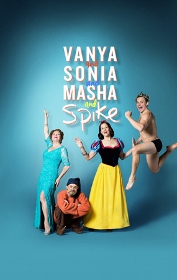
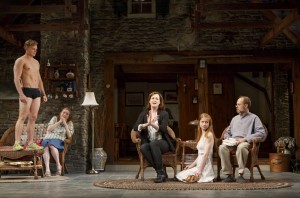
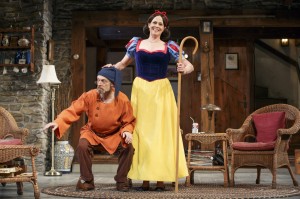
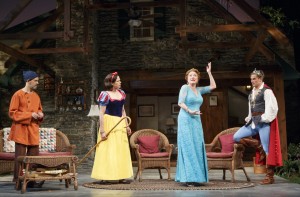
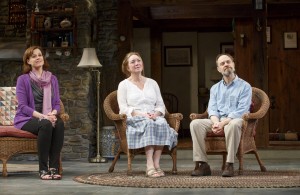
{ 1 comment… read it below or add one }
I saw the play at Goodman in Chicago and was disappointed to be right about it being straight forward plagiarism.
Chekhov’s plays that are labeled as comedies are indeed tragedies, and they are mostly about loneliness, suffering, betrayal, idealism.
Mr. Durang has attempted to modernize “Uncle Vanya” , “The Seagull”, “The Cherry Orchard”, and “Three Sisters” and put his name on the great Russian classic’s creations. By giving the play a “happy ending”, adding vulgarities, placing the setting into a Pennsylvania location, and adding modern day technology, Mr. Durang has attempted to make his play a comedy.
He in a way “succeeded”. Sadly, a lot of people in the audience were laughing.
To me, however, making fun of loneliness, Alzheimer’s, caring for elderly, failed marriages, unrealized dreams, jealousy, etc in the context of Chekhov’s characters may feel insulting to many whose lives have been affected by tragedies.
Even if Mr. Durang does find all of the above as so funny, why didn’t he write his own comedy without copying the great master’s ideas, plots, quotations, names, conflicts, problems, characters, and even names?
Unfortunately, Anton Chekhov is not here any more, and Mr. Durang can enjoy his “success”.